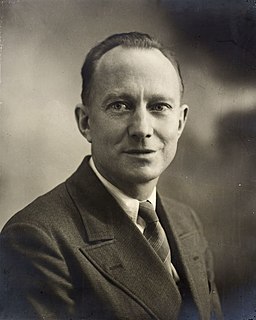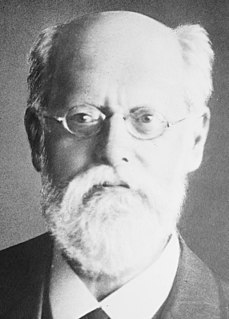A Quote by Hannah Arendt
Imperialism was born when the ruling class in capitalist production came up against national limits to its economic expansion.
Quote Topics
Related Quotes
The ideas of the ruling class are in every epoch the ruling ideas, i.e. the class which is the ruling material force of society, is at the same time its ruling intellectual force. The class which has the means of material production at its disposal, has control at the same time over the means of mental production, so that thereby, generally speaking, the ideas of those who lack the means of mental production are subject to it. The ruling ideas are nothing more than the ideal expression of the dominant material relationships, the dominant material relationships grasped as ideas.
The people's community must not be a mere phrase, but a revolutionary achievement following from the radical carrying out of the basic life needs of the working class. A ruthless battle against corruption! A war against exploitation, freedom for the workers! The elimination of all economic-capitalist influences on national policy...Maintaining a rotten economic system has nothing to do with nationalism, which is an affirmation of the Fatherland. I can love Germany and hate capitalism. Not only can I, I must.
I am not a capitalist soldier; I am a proletarian revolutionist. I do not belong to the regular army of the plutocracy, but to the irregular army of the people. I refuse to obey any command to fight from the ruling class, but I will not wait to be commanded to fight for the working class. I am opposed to every war but one; I am for that war with heart and soul, and that is the world-wide war of social revolution. In that war I am prepared to fight in any way the ruling class may make necessary, even to the barricades.
The monopoly of capital becomes a fetter upon the mode of production, which has sprung up and flourished along with, and under it. Centralisation of the means of production and socialisation of labour at last reach a point where they become incompatible with there capitalist integument. This integument is burst asunder. The knell of capitalist private property sounds. The expropriators are expropriated.
Man feels the urge to run up against the limits of language. Think for example of the astonishment that anything at all exists. This astonishment cannot be expressed in the form of a question, and there is also no answer whatsoever. Anything we might say is a priori bound to be nonsense. Nevertheless we do run up against the limits of language. Kierkegaard too saw that there is this running up against something, and he referred to it in a fairly similar way (as running up against paradox). This running up against the limits of language is ethics.
The history of mankind is a history of the subjugation and exploitation of a great majority of people by an elite few by what has been appropriately termed the 'ruling class'. The ruling class has many manifestations. It can take the form of a religious orthodoxy, a monarchy, a dictatorship of the proletariat, outright fascism, or, in the case of the United States, corporate statism. In each instance the ruling class relies on academics, scholars and 'experts' to legitimize and provide moral authority for its hegemony over the masses.
The capitalist engine is first and last an engine of mass production which unavoidably also means production for the masses. . . . It is the cheap cloth, the cheap cotton and rayon fabric, boots, motorcars and so on that are the typical achievements of capitalist production, and not as a rule improvements that would mean much to the rich man. Queen Elizabeth owned silk stockings. The capitalist achievement does not typically consist in providing more silk stockings for queens but in bringing them within reach of factory girls.
The Federated Republic of Europe-the United States of Europe-that is what must be. National autonomy no longer suffices. Economic evolution demands the abolition of national frontiers. If Europe is to remain split into national groups, then Imperialism will recommence its work. Only a Federated Republic of Europe can give peace to the world.
Imperialism creates the illusion of wealth as far as the masses are concerned. It usually serves to hide the fact that the ruling classes are gobbling up the natural resources of the home territory in an improvident manner and are otherwise utilizing the national wealth largely for their own purposes. Eventually the general public is called upon to pay for all of this, frequently after the military machine can no longer maintain external aggression.




































